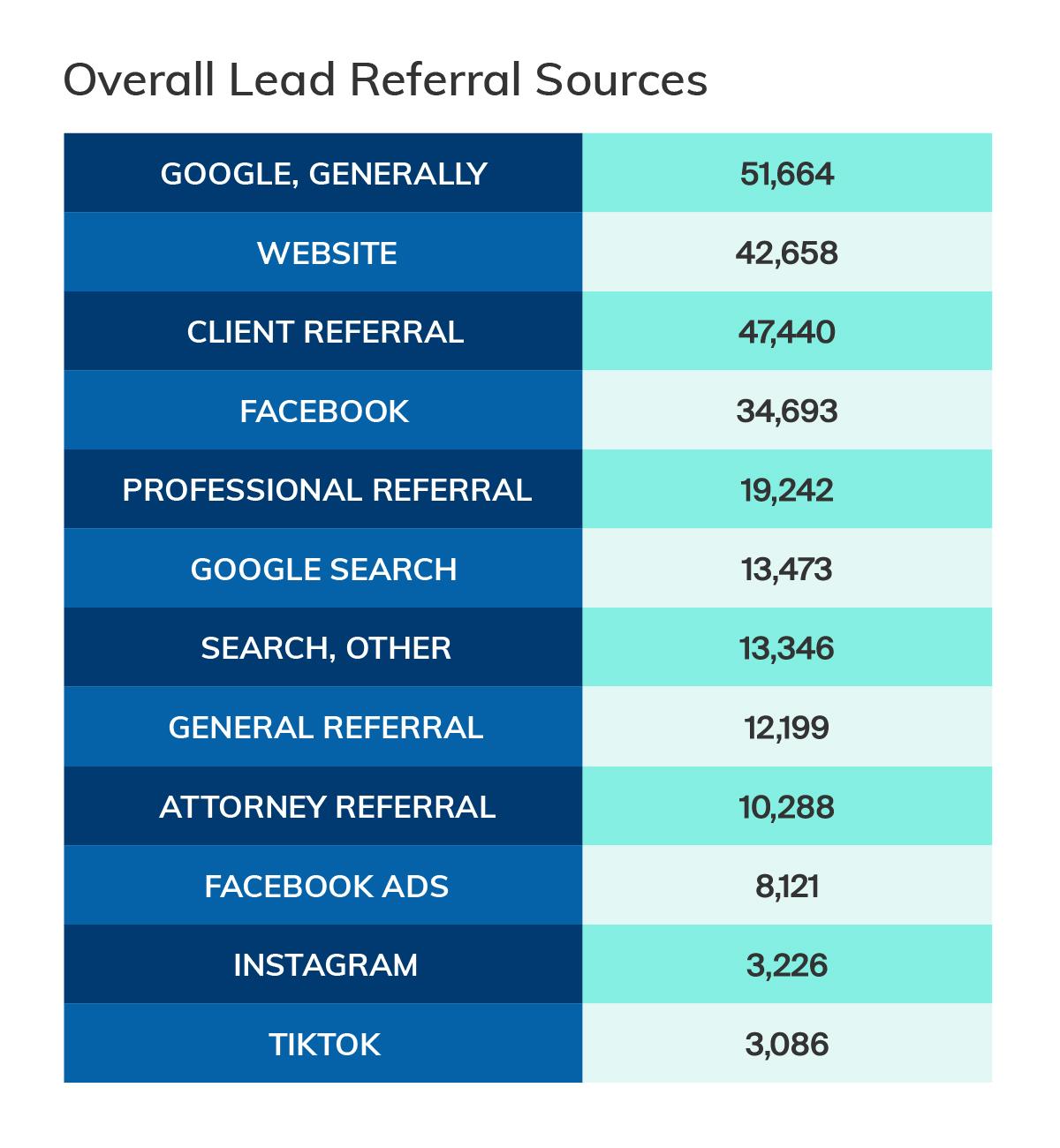According to SEO platform Ahrefs, there are about 28,000 searches each month for the term "law firm near me."Additionally, there are about 1,900 searches for "personal injury law firms near me" each month.
Chances are, prospective clients review and research the first handful of law firm websites the search engine suggests.
In this article, we'll cover the fundamentals of search engine optimization for lawyers. Use it to design a legal SEO strategy that will consistently deliver prospective clients to your law firm's website.
What Is SEO For Lawyers?
Search engine optimization, or SEO, is a set of practices designed to improve your law firm website's visibility in search engine results. An SEO program is essential for law firms because people often use search engines to explore their options for legal representation.
Data from case management software MyCase also confirms that Google was the highest lead source for law firms in 2023.

Benefits of Law Firm SEO
The main benefit of a successful SEO strategy is relevant website traffic. The online attention can become a cost-efficient source of growth for the firm.
SEO for law firms delivers other benefits as well, including:
Displacement of competitors. While search engines might return thousands or millions of results for a search query, people often don't look past the first 10 options. If your legal search engine optimization program moves your firm's website up into the top 10 results for a given query, it also bumps a competing website down.
Synergy with other marketing activities. Prospects often rely on information from different marketing sources to choose a law firm and other professional services. A website that's prominent in search can support and reinforce other marketing messages the firm distributes via television, radio, and printed materials.
Fundamentals of SEO For Lawyers
Below are nine legal SEO fundamentals that should shape your SEO strategy.
1. Keyword Research and Targeting
The first step in SEO for lawyers is determining target keywords to pursue. Keywords are the phrases people use to search for information online, such as "law firm near me" or "estate lawyers in Escondido."
Keywords form the backbone of a legal search engine optimization program. The first step is to identify keywords prospective clients search when they have legal troubles. The most appropriate keywords for your strategy will describe the firm's legal services, specialties, and geographic areas served.
Keyword Research Tools
There are keyword research tools online that help you identify those relevant phrases. Free options are available on Wordstream, Wordtracker, and Moz websites. To use them, enter a phrase to research. The tool then shares data on how often that keyword is used and how competitive it is. You'll also get a list of related keywords.
Local and Long-tail Keywords
While it can be tempting to target only the highest-volume phrases, law firm marketers should also incorporate local phrases and long-tail keywords into their strategy.
Local keywords include references to a city or geographic area.
Long-tail keywords are low-volume phrases that are very specific. An example would be "real estate law firm near me free consultation."
Relevant local and long-tail keywords will be less competitive and higher-converting than broad, high-volume phrases. For this reason, they're an essential component of SEO for legal firms.
Keyword Intent
Sometimes, a keyword phrase can be associated with different intents. An example is the phrase "what do personal injury lawyers do?" This could signal someone who's in the market for a lawyer. Or, it could be a college student researching career options.
Understanding user intent is an important aspect of selecting keywords to target. By misinterpreting intent, you may end up targeting keywords that are irrelevant to your business—wasting your law firm’s digital marketing resources.
To clarify keyword intent, search the phrase yourself and review the top results. For efficiency, do this before you commit to a list of targeted keywords. We have an example of this below.
Keyword Intent Examples for Lawyers
Informational The user is looking for definitions or answers to specific questions. | Navigational The user is searching for nearby services. | Transactional The user is ready to sign-up or make a purchase. | Commercial The user is comparing products or services |
|---|---|---|---|
Criminal law | Personal injury lawyer near me | Hire a lawyer near me | [Lawyer/Firm Name testimonials] |
What is criminal law? | Closest law firm to me | Fast legal representation for [case type] | Best law firm for divorce |
Criminal law examples | Directions to [law firm] | 24/7 lawyer for [case type] | Top personal injury lawyer in Texas |
2. On-Page Optimization
Search engines scan websites to understand and categorize their content. The structural components of a webpage play an important role in this process. The ones to know are title tags, meta descriptions, URLs, header tags, and alt tags.
Title Tags
Title tags describe the webpage's overall subject matter and are a confirmed Google ranking factor. They should include your target keywords.
Search engine results show the page's title tags as the headlining phrase for each listing. Any portion of the title tag that matches the keyword searched will be bolded.

Title tags should be 55 to 65 characters in length. For branding purposes, many websites add their business name at the end of title tags—where space allows.
Technically speaking, title tags appear in the code between <title> and </title> references. Most content management systems (CMS) provide a place to input page titles without writing code.
Title tags should be 55 to 65 characters in length. For branding purposes, many websites add their business name at the end of title tags—where space allows.
Technically speaking, title tags appear in the code between <title> and </title> references. Most content management systems (CMS) provide a place to input page titles without writing code.
Meta Descriptions
The meta description summarizes the page content in sentence form. This often appears beneath the title tag in search engine results.

A good meta description is concise, engaging, and intriguing. It inspires the searcher to click from the search engine to the firm's website. Like the title tag, use of the keyword searched will be bolded.
As a best practice, keep this description shorter than 155 characters. Anything longer than that can get cut off and replaced with an ellipsis.
URLs
The page URL also helps search engines understand the content of the page. For optimum results, include a targeted keyword in the page address. Some examples of SEO-optimized URLs relevant to law firms could look like the following. An independent lawyer's website might have URLs like this:
yourwebsite.com/houston-criminal-defense-attorney
yourwebsite.com/houston-family-law-attorney
Whereas a nationwide law firm might want to cover broader territory with its URLs:
yourwebsite.com/practice-areas/personal-injury
yourwebsite.com/practice-areas/criminal-defense
yourwebsite.com/locations/houston
yourwebsite.com/locations/manhattan
There is no length limitation on URLs, but shorter is better.
Header Tags
Header tags are used within the content to denote information hierarchy and helps search engines better understand your content. The H1 tag, or top-level header tag, is most often assigned to the main title of a webpage. H2 and H3 tags can also be used to tag second- and third-level headers within the content.
In a blog post, for example, the H1 tag is typically used for the post title. H2 and H3 tags function as sub-headers within the article.
Header tags are important signals to search engines, but they also serve a critical visual purpose for readers. Sub-headers break up long sections of text and allow readers to scan the page to find specific information.
Alt Tags
Alt tags are text descriptions of the images that display on a webpage. Alt tags only show on the screen when an image fails to load. Screen readers do use alt tags to describe images to people with impaired vision.
Alt tags inform search engines about the content of the page. They can also drive image-related traffic to the website.
Alt tags should be written as concisely as possible and accurately describe the image in context to the page it lives on. Limit the image descriptions to 125 characters or less, since that is the cap for many screen readers. Alt tags can include keywords if they are relevant to the image description.
As with title tags, most website content management systems allow for the input of alt tags without writing code.
Avoid Over-Optimization
Title tags, meta descriptions, header tags, alt tags, and page content should use targeted keywords, but moderation is required. Search engines favor websites that use keywords naturally. Use keywords excessively and the site will have trouble appearing in search results altogether.
To avoid overuse of keywords, prioritize the development of helpful content that's focused on user intent. Write natural-sounding title tags, meta descriptions, and alt tags. Add keywords and related phrases as appropriate after the content is written.
3. Quality Content Creation
Search engines reward websites that answer search questions thoroughly and practically. The path to success involves publishing legal content that is high-quality, informative, and engaging.
That process begins with a content plan that's shaped from your list of targeted keywords, plus what you already know about your clientele. Look to answer common legal questions, provide insights, and educate the audience.
Know that Google Search does apply higher standards of transparency and accuracy to content topics that can affect people's safety, welfare, and financial health. The search engine defines those sensitive topics as Your Money or Your Life (YMYL). Law firm websites that address legal issues, such as DUIs and personal injury, are subject to these higher standards.
Evergreen and Local Content
You'll find that focusing on evergreen and local content is more efficient than publishing news-driven or timebound topics.
Evergreen content remains relevant over time. It is not seasonal, time-sensitive, or trending
Local content focuses on issues and topics relevant to searchers who are in the geographic area served by the firm
Evergreen content has a long lifespan and can drive traffic to the firm's website for months or years. The benefit of local content is that it typically converts website visitors into clients at a higher rate.
Varying Content Formats
Your best content plan should incorporate varying formats. Look to create and publish comprehensive and downloadable guides, blog posts, case studies, videos, testimonials, interviews, infographics, and FAQs.
Remember, your online content must be published in search-friendly formats. Videos, for example, can be engaging for mobile users, but search engines don't comprehend them very well. Consider including captions or a text transcript with your videos. This provides more information to search engines and your website visitors who may prefer to read rather than watch.
4. Local SEO for Law Firms
Most firms rely on local clientele to build their business. Local SEO targets prospective clients who are in the areas served by the firm. These prospects are easier to convert compared to. searchers who are hundreds of miles away.
Below are four main elements of local SEO marketing for law firms.
Incorporate local keywords which are search phrases that include a reference to a specific city, town, or locale.
Add contact information on the website including the business name, address, and phone number. In SEO terms, these elements are collectively called NAP. They should be consistent on the website and across all other online locations. This includes Chamber of Commerce listings and mentions in other online business directories.
On the firm's website, pay special attention to the business information shown on legal disclaimers, website terms and conditions, and privacy policies. These pages tend to be overlooked in website reviews, so they can easily be hiding outdated NAP information.
Sign up for a free Google business profile, which provides verified information that's used by Google Search, Google Maps, and Google Reviews. The profile includes name, address, phone number, and website. You can optionally add office hours, photos, and management responses to Google reviews.
Monitor reviews. Good user reviews can support local SEO marketing for law firms by giving Google—and local prospects—positive signals about your business. Unfortunately, bad reviews can do the opposite. Manage this proactively by putting a system in place to ask your most satisfied clients to write reviews.
5. Link Building for Law Firm Websites
Link building is the practice of securing links that point to the law firm's website. The quality, number, and relevance of incoming links is a search ranking factor.
How to Earn Backlinks to Your Law Firm's Website:
Produce unique and useful content that other sites want to reference with a link. For example, you might host a survey and develop an interesting analysis from those survey results.
Join services like Qwoted and HARO to locate opportunities to provide expertise in exchange for a link.
Ask colleagues and vendors about linking opportunities.
Seek out guest posting opportunities and content partnerships that allow you to include a link back to the firm's website.
Note that Google frowns on paid links and links coming from irrelevant or spammy websites.
6. Mobile Optimization
Google primarily uses websites' mobile versions for evaluation and ranking. That means a law firm website without a functional, engaging mobile experience will struggle to generate SEO traffic.
Responsive web design is the standard in today's world. A responsive website has one code base that includes multiple layouts appropriate for different screen sizes. Most modern templates for popular content management systems such as WordPress are responsive.
7. User Experience
Mobile optimization is one aspect of a larger discipline called user experience or UX. UX best practices seek to create intuitive, engaging, and interesting online experiences. Since search engines prefer websites that provide good experiences, efforts put towards UX directly support a law firm's SEO strategy.
Both the overall organization of a website and the elements on a single webpage affect user experience. For example, a website with a logical menu and intuitive information hierarchy is easier to navigate.
Consistent use of design elements throughout the website also supports user confidence—as does the use of confirmation messages. A simple example is displaying a "thank you" message after the user submits a message through a website form. This prevents the frustration of wondering whether the submit button has worked.
Note that there are also technical aspects to good user experience. A big one is site speed, which is also a search ranking factor. Web pages should load quickly and completely, on both desktop and mobile devices.
Fixing a slow-loading website often requires the help of an experienced developer and/or a new web host.
MyCase websites, offered as an add-on to MyCase customers, incorporate UX best practices by default. They also include client-friendly features like integrated intake forms and a secure communications portal. The hosting and technical support for these websites are conveniently managed by MyCase.
8. Tracking and Measuring Success
There are many opinions about how to optimize a law firm website for SEO, but ultimately what works best is testing, monitoring results, and learning from the outcomes. That process requires the use of search analytics tools, legal analytics software, and key performance indicators or KPIs.
The Best Free SEO Analytics Tools
Google Search Console (GSC): GSC shows the search phrases that drive users to the website. It also includes data on website indexing, mobile friendliness, and site speed.
Google Analytics: Google Analytics tracks website views, user engagement, referral sources, conversions, and much more.
Bing Webmaster Tools: Bing Webmaster Tools is Bing's version of GSC. In addition to sharing search phrases for your website, it also has a site audit tool that scans for technical errors.
PageSpeed Insights: Enter a URL in this tool to get a complete report on the webpage's performance. The report also includes recommendations for improvements.
Microsoft Clarity: Microsoft Clarity provides heatmaps and session recordings for websites. Heatmaps are visualizations of where website visitors are clicking on webpages. These can highlight design issues that are causing negative user experiences. Also, session recordings show how website visitors navigate from page to page.
These tools provide a lot of data that are often overwhelming to review and evaluate. For this reason, a KPI dashboard within Google Analytics or a third-party tool is an essential tool for law firm SEO. A good KPI dashboard gives you a quick snapshot of how the website is performing on high-level metrics.
SEO KPIs for Lawyers
Website visits
Traffic sources
Average time on page
Average page views per session
Number of leads generated
Rate at which website visitors are converted to leads
9. Schema Markup for Legal Content
Schema markup is code that categorizes specific content on a website. Search engines use markup to display extra information in search engine results, such as a business's review rating. The extra information draws more attention visually and potentially garners more visits. A higher click-through rate from search engines may lead to a boost in ranking.
Schema types that a law firm search engine optimization program should use are:
Attorney schema: Attorney schema includes tags to identify the attorney's name and bio, practice areas, contact information, reviews and ratings, office locations, and social media profiles.
LegalService schema: LegalService schema identifies the firm's name and description, geographic service area, contact information, office hours, and payment methods.
LocalBusiness schema: LocalBusiness schema highlights the firm's location, contact information, and office hours.
You can test and optimize schema markup for free with Google's Schema Markup Testing Tool.
Staying Updated with SEO Trends in the Legal Industry

Google Search, which dominates the search landscape with 89% market share, implements nine to 10 major algorithm updates annually. The algorithm is the set of rules that dictate which websites appear in search results.
Each algorithm update can add another layer of complexity to your law firm SEO strategy. Staying current on those changes helps you maintain the website's prominence online.
Consider subscribing to one or two reputable SEO newsletters, such as those offered by Search Engine Land and similar websites. When you see headlines about confirmed or unconfirmed algorithm updates, check the site's traffic and keyword performance in Google Analytics and Google Search Console. If the site's average position for important keywords has dropped, research the nature of the algorithm update.
That research may reveal immediate improvements you can make to the website, or it may not. Keep in mind that Google and other search engines don't share the exact nature of their algorithms. So there will be times when the path forward isn't entirely clear.
In those times, resist the urge to make drastic changes to the firm's website or content. Instead, take the time to do an SEO health check. A couple quick questions you can ask yourself include:
Are there key technical or UX issues that need to be resolved?
Is your content serving your audience's search intent?
Try to focus on incremental improvements. For example, you can test out content updates, new content forms and topics, and small design changes to make the website more functional and engaging.
The goal of your website is to bring new clients into the firm. At a minimum, improved user engagement makes that process more efficient. It's also likely to benefit the site's SEO performance.
Start Ranking With A Law Firm SEO Strategy
Now you know that a solid law firm search engine optimization strategy covers:
Keyword research
Understanding search intent
Building a content plan
Using HTML tags, title tags, header tags, alt tags, and schema markup tags to your advantage
Tracking KPIs in Google Analytics or a third-party reporting tool
Building on those learnings to continually improve search traffic and user engagement over time
Admittedly, running a law firm search engine optimization program is resource intensive. If your firm doesn't have the capacity for SEO currently, consider building or switching to a website design that takes care of the SEO basics. Many firms rely on software like MyCase to build and host engaging, SEO-friendly websites. Website creation is available as an add-on service to MyCase's case management platform.
For further efficiencies, LawPay can help your firm get paid faster and more securely. Clients love LawPay's range of payment options, from eCheck payments to legal fee financing. Plus, all payments are handled in compliance with IOLTA and ABA guidelines.
LawPay also adds more efficiency with in-platform time-tracking, invoice creation, and digital billing.
Learn more about how MyCase and LawPay can streamline billing and support the health and growth of the firm over time. Schedule a demo with MyCase and LawPay today.
Schedule a demo to see what LawPay can offer your firm.
Book Now
About the author

The LawPay Team
